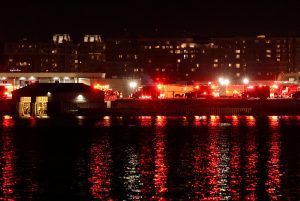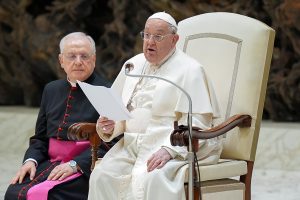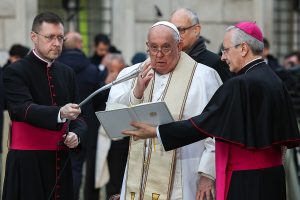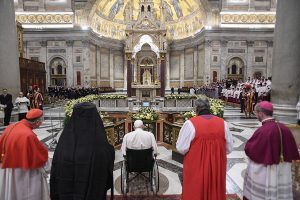WASHINGTON (OSV News) – Claims that the U.S. bishops’ conference profits from its partnership with the government to assist refugee populations that qualify for federal assistance, and that the Catholic Church facilitates illegal immigration are “just wrong,” said William Canny, the U.S. bishops’ migration director.
Canny, executive director of the U.S. Conference of Catholic Bishops’ Migration and Refugee Services, made the comments in an interview Jan. 30 with OSV News in the wake of remarks by Vice President JD Vance and President Donald Trump’s press secretary.
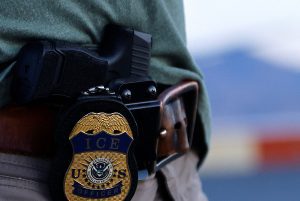
Vance, who is Catholic, questioned the motives of the U.S. bishops’ criticism of Trump’s new immigration policies in a Jan. 26 interview – including reducing restrictions on raids on churches and schools. He asked if the bishops are actually concerned about receiving federal resettlement funding and “their bottom line.”
The same week, in her debut press briefing as White House press secretary on Jan. 28, Karoline Leavitt, also a Catholic, suggested the Trump administration would seek to strip federal funds from nongovernmental organizations including Catholic Charities as part of its effort to enforce its immigration policies. In that exchange, Catholic Charities was accused of facilitating illegal immigration, claims the domestic charitable arm of the Catholic Church in the U.S. has long denied.
The USCCB website states that its Migration and Refugee Services “is the largest refugee resettlement agency in the world,” and that in partnership with its affiliates, it resettles approximately 18% of the refugees that arrive in the U.S. each year.
Audited financial statements by an outside firm show that the USCCB received about $122.6 million in 2022 and about $129.6 million in 2023 in funding from government agencies for refugee-related services. But the same statements show that the USCCB spent more on those services than the government gave them, meaning the conference did not profit from the grants, according to the conference’s auditors. In 2023, for example, the conference spent $134.2 million for such services.
“We have an obligation to the federal government, when we take these grants, to report back to them, to monitor the activities that these agencies carry out. We’re talking food, housing, clothes, medical attention, et cetera, so we have an obligation to monitor that,” Canny said. “The conference does not profit from this money. And in fact, we cannot, we do not run these programs without putting also in some private funds. So there’s absolutely no profiting from these federal grants.”
The refugees eligible for the program, he added, “are highly vetted” by the U.S. government.
“When these refugees come in through this particular program, they are on a path to citizenship in this country,” Canny said. He added the program assists them with basic needs like housing, medical care and job searching.
When it comes to immigration policy, Canny said, the U.S. bishops are supportive of policies that are just, yet humane.
“Let me be clear that we believe that our country has a right to control its border and a legitimate right to determine who can come in and who can’t into the country, within the bounds of justice and law,” Canny said.
He added, “The sanctity of every human life is important to the Catholic Church, the God-given dignity of each person, regardless of nationality or immigration status. So some of these executive orders that have a tendency to disregard the humanness of people” are cause for concern.
“Government authorities have the right and responsibility to promote public safety and security and to enforce just laws,” Canny said. But he pointed to denying those with “legitimate asylum claims” entry, and fewer restrictions on raids in sensitive locations like churches as particular causes for concern.
After Vance’s comments, the USCCB issued a statement defending its work with refugees.
Others weighed in more sharply, including Kim Daniels, the director of the Initiative on Catholic Social Thought and Public Life at Georgetown University, who wrote on X that arguments the U.S. bishops are “advocating for open borders” are false.
“It all comes down to an old strategy: politicians targeting Catholics for political gain,” she said.
Cardinal Timothy M. Dolan of New York, who gave prayers at both of Trump’s inaugurations, including his second with Vance just days earlier, called the new vice president’s comments “just scurrilous” on his SiriusXM Catholic Channel show.
“I was really disappointed,” Cardinal Dolan said, calling the comments “not only harmful, this was inaccurate.”
“It’s very nasty,” Cardinal Dolan added, inviting Vance to “come look at our audits.”
“You think we make money caring for the immigrants? We’re losing it hand over fist,” Cardinal Dolan said.
Cardinal Dolan praised Vance on other issues, including comments he recently delivered to the March for Life, and said he hoped the comments against the church were “uncharacteristic.”
Canny said the Catholic Church has long held its view on serving refugees, and the U.S. is a nation of immigrants. He pointed out the first American citizen to be canonized – Mother Frances Cabrini – was an immigrant.
Asked how they planned to engage with the Trump administration on immigration policy, Canny said, “Certainly as they organize and get people into place, we hope to be able to meet with them directly and discuss these matters as the U.S. Conference of Catholic Bishops has done with every administration.”
“So we hope that that will happen to avoid misunderstandings in the future,” he said.

